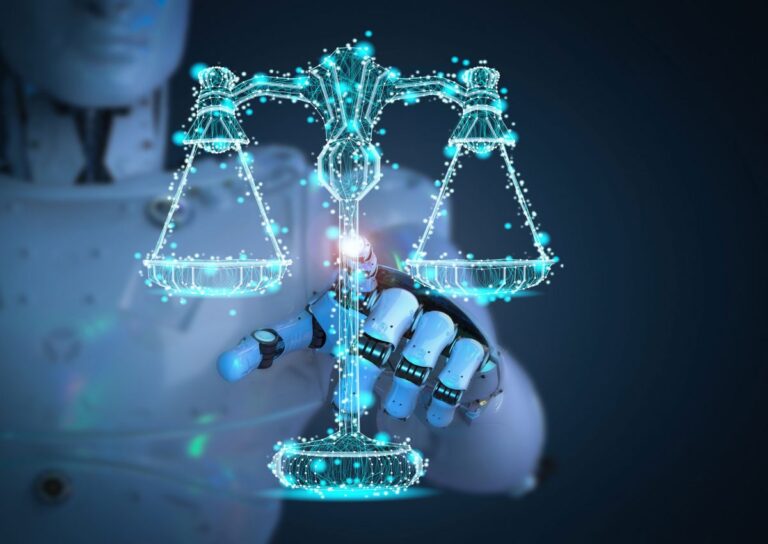AI, Law and Speeding Up the Judicial Procedures
The humankind has always engaged in the debates regarding issues of unemployment and technological advancements. For example, during the industrial revolution there were those who argued that the machines would replace humans in the workforce and thus would lead to mass unemployment and social depression or even the end of humanity. Nevertheless the enormous effect of the industrial revolution is obvious, as is the fact that it did not lead to the human extinction and even led to an increase in wealth and prosperity. Similarly, now we are witnessing important technological developments and simultaneously led to the reoccurrence of the debate caused by the industrial revolution. Especially in recent years such developments as the blockchain technology and WEB 3.0 tech, the AI too has shown a stunning growth in recent years.
Recently the OpenAI developed an AI with an extremely high capacity named ChatGPT 4, this led to reoccurrence of this subject. The expectations are that by 2030 all of the human work will be done by the AI. Though it is not year clear in the less developed countries, this might lead to concerns about mass unemployment.
The book called “The Rise of Robots” by Martin Ford, quotes Milton Friedman: Friedman once was advising a company in Asia and when he was walking in the project field, he saw that the workers were using shovels, and that there was no tractor or a bulldozer to be seen. When he asked why this was the case, the answer he received was that it is an “employment project”. Friedman replied, “well, then let workers use the spoons instead”. (By the way, when I was reading this anecdote, I thought of the inflation of the salaries of the government officials. Turkey is already giving its government officials spoons to work if you know what I mean.)
As in Friedman’s joke, it makes little sense to get anxious about the unemployment-like issues resulting from technological developments. I think that these issues should be argued about but these arguments shouldn’t lead to anxiety. This is because similar anxieties surrounded the Industrial Revolution and in the end, despite a short period of depression, the humanity mastered those machines and learnt how to use them, this led to the rise of new professions and prosperity. Obviously we’ll find a way of using the abilities of robots to increase our wealth as well. This will lead to a period of change and transformation, maybe to a very serious change, however in the very end, if we’ll be able to adopt and make the necessary changes, this would benefit the humankind. The PriceWaterHouseCoopers published a report in which it states that by 2030 the AI will lead to a 15.7 trillion dollars growth in the global GDP. Lots of reports on the AI show that it could lead to an increase in wealth. Obviously, the ways of earning money, financial system etc. will fundamentally change.
As Martin Ford notes in his book (The Rise of Robots), “historically we thought of the machines as of tools, now they will become the autonomous workers.” However, in the short term the need for humans will preserve itself to a certain extent. Soon enough, people won’t sit into a car with no driver, they won’t trust a robot without a doctors supervision and won’t enter a plane with no human pilot in it.
Concerns regarding AI are not limited to unemployment and depression that is looming over the humankind. Concerns about AI may also include, security of the personal data, supervision of the AI and the energy consumption. The source of all concerns is that humans aren’t smart enough to supervise an AI. Among the most interesting ideas regarding AI is the idea of AI being supervised by an AI. These highly sophisticated bots and robots truly have an enormous capacity.
The above mentioned concerns regarding the AI may affect our lives in the short term and many of these are true. First of all, the research regarding the security of the personal data should be conducted in cooperation between the lawyers and computer scientists. Especially in the developing countries such as Turkiye, the precautions in regard to the security of personal data should be more common. On the other hand the fact the the AI algorithms are open-source means that the transparency of the research and data sharing will be important in the sense of security. Already, although attempts in this regard are insufficient, I’m sure that the necessary regulations will be adopted. In regard to this issue, Darrel M. West in his article “Six Steps to Responsible AI in the Federal Government” said:
“There’s a consensus that a set principles regarding the transparency, justice, personal data security, human safety and explainability of the activities should be set. Almost all of the ethics experts and advocates of the policies regarding technologies underline the importance of these factors and support the usage of just, safe and understandable algorithms.”*
On the other hand, in Turkiye the subject isn’t researched anywhere other than the Istanbul Barr IT Commission and several academicians. I must say that Turkiye is behind on this issue just as it is in the sense of the personal data protection law.
Usage of the AI in Law and Advise About National Judiciary Informatics System
As those who follow the issue will know, recently there was an attempt to use the AI as a lawyer in court but wasn’t allowed to proceed in the United States. The accused person made the AI prepare the defense for him and used it in court. In the end, when the defendant could’ve gotten a smaller punishment he got the bigger one as his defense was insufficient. This AI has also helped lots of other people, however the developer received lots of complaints from the customers who thought that they were deceived.
You can easily access the details of this event with a little research.
To avoid writing too much here and making the article boring, I would like to sum it up:
The AI could be used as a good assistant attorney or paralegal. However, it is definitely not at a point where it could function as a lawyer. On the other hand, using the AI to find the case law for the complaint, prepare the evidence is possible thanks to AI. The article in the brookings edu by John Villasenor named “How AI will revolutionize the practice of law” talks about usage of the AI in law:**
Villasenor says that though the AI won’t replace lawyers, it will facilitate their jobs, can allow them to do some of the work at a lower cost and write the complaints using AI, this may lead to an increased access to justice by allowing people with smaller incomes to use services of the lawyers. According to Villasenor, judges too may use AI. AI may facilitate the evaluation and research of the evidence etc.
In my opinion, more sophisticated AI might be used for account expertise and some of the other expertise. Thus, expert evaluation that takes months will be obtained faster, thus speeding up the judicial procedures.
If so, I would like to finish this article with a proposal:
After the elections in Turkiye, the new Minister of Justice whose name is yet unknown, must consider the National Judicial Network Project 2.0 and develop its functions. First things first, national judicial network project 2.0 should include the natural language processing technology. Both lawyers and ordinary citizens should be able to search for case law in the new system, using AI. Additionally, speeding up the judiciary procedures by speeding up the expert report preparation and evaluation process. “Counting” segment should be introduced to use the accounting experts. The existing reports might be erroneous, the lawyers and the judges are checking the accounts. For sure the judicial procedures can become faster thanks to AI.
Attorney Haldun Barish
References:
* Darrel M. West, Six Steps to Responsible AI in the Federal Government, https://www.brookings.edu/research/six-steps-to-responsible-ai-in-the-federal-government/
** Villasenor John, “How AI will revolutionize the practice of law”, Mart 2023, https://www.brookings.edu/blog/techtank/2023/03/20/how-ai-will-revolutionize-the-practice-of-law/
Diğer Bazı Kaynaklar:
Ford Martin, Robotların Yükselişi, Kronik Kitap, 11. Baskı, 2022
Chul Han Byung, Şeffaflık Toplumu, Metis, Ekim 2022











